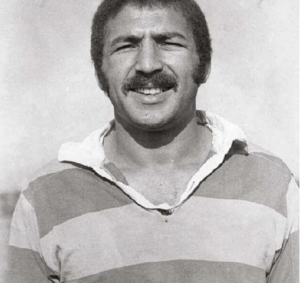In the 13th instalment of a series on black rugby legends, GARY BOSHOFF looks back at the career of former Tygerberg No 8 Clive Thomas.
EARLY LIFE
The most fascinating aspect of Clive Thomas’ rugby career is that despite being recognised by his peers as one of the most talented No 8s of his era, he never managed to gain selection to the Saru team. His mentor, the former Saru national coach Millin Petersen, often referred to his omission as one of the ‘gross selection injustices’ in the history of Saru rugby.
Thomas hails from the southern Overberg town of Bredasdorp, where he was raised by parents Conrad and Mary. A qualified teacher, Conrad moved to Bredasdorp from Paarl to take up a post at the Medland Primary School in the late-1940s. He met Mary in Bredasdorp and decided to settle down in the picturesque town.
Conrad was an enthusiastic rugby player and grew up in the rugby-mad community of Paarl, where he played for the local club, Riverstones. In Bredasdorp, he joined up with Standards RFC, one of the two local rugby clubs.
‘My father never played any representative rugby,’ recalls Clive. ‘But I vividly remember his stories about playing for the South African army team while stationed in Egypt during World War II.’
Clive attended Medland Primary School and while the standard of rugby was not high, he was able to follow in his father’s footsteps by playing flank or No 8.
‘Having seen my father play many times, I always wanted to emulate him by playing one of those positions. But even at that early age, No 8 was my preferred position.’
Being a serious educationist, Clive’s father decided to send him to some of the better high schools in Cape Town. He stayed with his uncle in Cape Town and attended Grassy Park High in Standard 6 (Grade 8). The following year he was accepted at Harold Cressy High, widely regarded as the top academic school reserved for the ‘coloured community’ during the days of apartheid.
Harold Cressy High offered rugby as a sport, though the competition was not serious enough for young Thomas. He played scrumhalf for a few years and then moved back to No 8.
RUGBY CAREER
During his final school year, Thomas joined Universals RFC, which played in the City and Suburban Rugby Union. He matriculated in 1970 and decided to find a job. In his first year of work, as an apprentice at Murray & Roberts Construction, he had to give up rugby because he was required to work on Saturdays.
Thomas’ enthusiasm for the game was rebooted when a number of players from the Meltons RFC (Elsies River) joined Universals. The quality of rugby improved and he started to enjoy the game again. In fact, the next year, when the Meltons players returned to their club (which affiliated to the newly formed Saru union Tygerberg RFU), Thomas followed them and Meltons RFC became his new home.

This was the start of Thomas’ rise as a rugby player. Millin Petersen, who would later be appointed as the Tygerberg and Saru coach, became his mentor and one of his biggest fans. The period 1972-1979 was his best as he was the first-choice No 8 for Tygerberg.
‘I really enjoyed playing under Millin; his in-depth knowledge of the game and ability to inspire me and my fellow players strengthened my resolve to excel in the game,’ says Thomas.
In 1974, he was selected for the national invitational XV that played against the Saru team and in 1978, he represented Tygerberg when they beat Boland 6-0 in the SA Cup final.
The ultimate compliment for this accomplished No 8 came from Petersen, who often described Thomas as ‘the most intelligent and skilled No 8’ he had coached during his decorated coaching career.
When Thomas left Tygerberg in 1979, he joined Gardens RFC in Paarl and represented Boland RFU in the SA Cup for a few more years, three of them as captain. He retired from the game relatively early,at the age of 30, which he does not regret.
‘I played with and against many great players, who I admire and respect,’ he says. ‘Julian Smith, Temba Ludwaba, Peter Mkhata, Peter Jooste and Desmond Kramer are but a few.’
In 1983 and 1984, he coached at Gardens RFC, where he had Peter de Villiers, who would go on to coach the Springboks, as his assistant.
LIFE AFTER RUGBY
Thomas never married and is still ‘single and happy’. He readily admits that he was not the most talented sportsman in his family. His brother, Gordon, excelled in athletics (sprints and high jump) and earned provincial colours for Boland.
Thomas says former All Blacks captain Graham Mourie is his rugby hero, because of the stance he took against apartheid when he refused to tour South Africa with the All Blacks in 1976.
Thomas still believes the Springbok emblem represents a bygone era of oppression and discrimination in sport, but remains positive about South African sport and continues to support initiatives to integrate and increase access to rugby, in particular.

involved in the game
Thomas loves the company of his former rugby teammates, but he is done with the game. He has no desire or ambition to coach or get involved with the administration side of rugby again.
In a certain sense, he does not have to, because he has done his part and proved his worth.
– This article first appeared in the April 2017 issue of SA Rugby magazine





